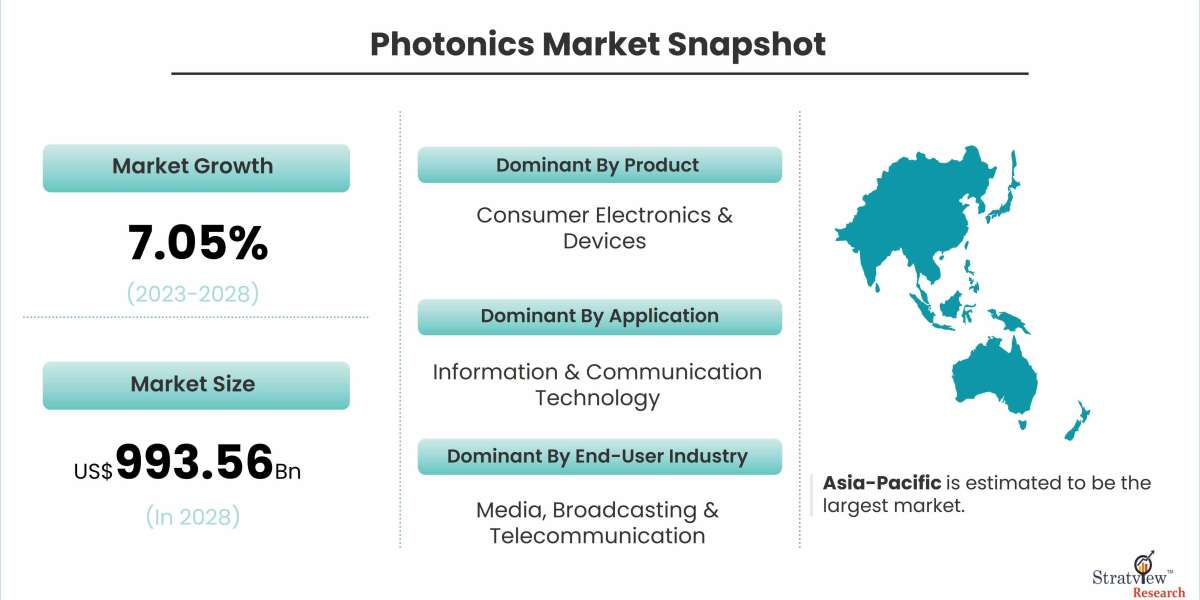The photonics market is experiencing rapid expansion due to a combination of technological advancements, growing applications across diverse industries, and increasing global demand for energy-efficient and high-speed technologies. Photonics, which deals with the generation, manipulation, and detection of light, is becoming integral to fields such as telecommunications, healthcare, manufacturing, and energy. This growth is fueled by several key drivers that are pushing the boundaries of what light-based technologies can achieve.
According to Stratview Research, the photonics market was estimated at USD 659.28 billion in 2022 and is likely to grow at a CAGR of 7.05% during 2023-2028 to reach USD 993.56 billion in 2028.
Technological Advancements
One of the primary driving forces behind the growth of the photonics market is the continuous evolution of technology. Advancements in optical components, such as lasers, sensors, and optical fibers, are significantly improving the performance and efficiency of photonic systems. In telecommunications, innovations in fiber optics are enabling faster internet speeds and greater data transmission capacities. The global rollout of 5G networks, which relies heavily on photonic technologies, is further accelerating market growth.
In healthcare, photonics is driving advancements in medical imaging, diagnostics, and treatment. Techniques such as optical coherence tomography (OCT) and laser surgeries have revolutionized healthcare by providing non-invasive, highly accurate methods for diagnosing and treating conditions like cancer, eye diseases, and cardiovascular problems. These innovations are enhancing patient outcomes and increasing the demand for photonics-based solutions.
Demand for Energy Efficiency
Another major factor driving the photonics market is the growing emphasis on energy efficiency and sustainability. Photonics plays a crucial role in developing energy-efficient technologies, particularly in renewable energy sectors like solar power. Photovoltaic cells, which convert sunlight into electricity, are becoming more efficient and cost-effective thanks to photonics innovations. As the world transitions to cleaner energy sources, the demand for advanced photonic solutions in solar energy generation will continue to rise.
Additionally, photonics is helping industries reduce their energy consumption through the use of energy-efficient lighting and displays. Light-emitting diodes (LEDs), for instance, have become a popular alternative to traditional lighting due to their longer lifespan and lower energy usage.
Expanding Applications Across Industries
Photonics is finding applications in an ever-growing number of industries. In manufacturing, photonics technologies like lasers are being used for cutting, welding, and additive manufacturing, enhancing precision and productivity. In defense and aerospace, photonic systems are critical for developing advanced sensors, communication systems, and navigation technologies, contributing to national security and military advancements.
Consumer electronics is another area where photonics is making significant inroads. The development of augmented reality (AR) and virtual reality (VR) devices, which rely on photonic components for immersive experiences, is opening up new opportunities in the market. Additionally, smartphones, cameras, and televisions are being improved through innovations in photonics, driving consumer demand.
Conclusion
The expanding photonics market is being driven by a combination of cutting-edge technological advancements, the global push for energy efficiency, and the increasing integration of photonics into various industries. As more sectors embrace light-based technologies to meet the demands of a rapidly evolving world, the photonics market is poised for sustained growth, with opportunities emerging in telecommunications, healthcare, energy, defense, and consumer electronics. The future of the photonics market looks bright as innovation continues to unlock its potential across multiple applications.








